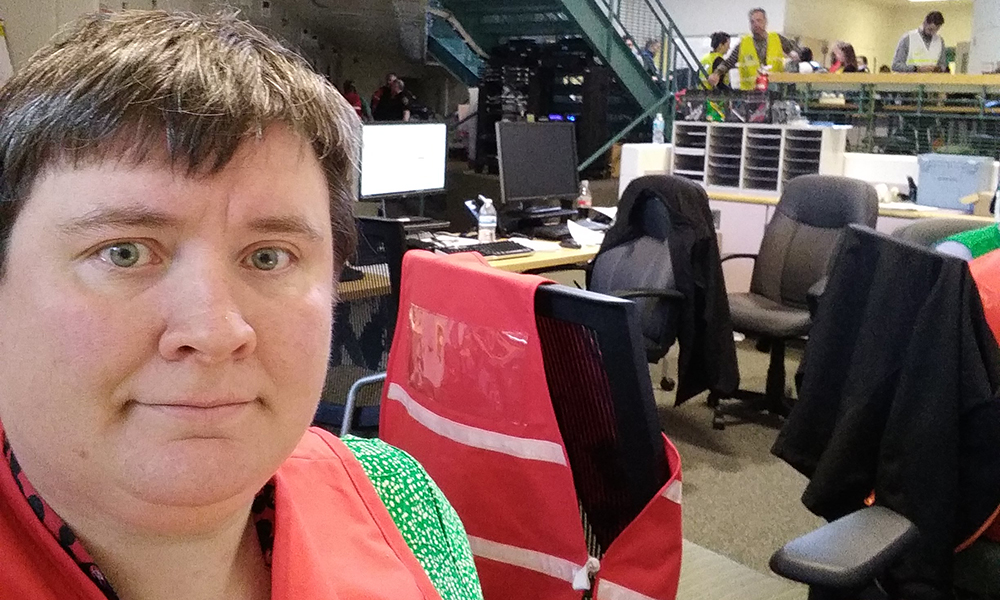JMU alumna responds to measles outbreak in Oregon
NewsBy Creative Services Staff Writers

Since the beginning of 2019, there have been over 700 confirmed cases of measles in the US – the highest number of reported cases since 1994. Beth McGinnis (’00) has a role with the measles outbreak response taking place in the Portland Metro area of Oregon.
This particular outbreak was likely begun with a local resident contracted the disease while visiting the Ukraine, where measles is endemic. Symptoms appeared after returning to the U.S in mid-January and it has spread throughout the area. “What has happened here is unique because the Pacific Northwest has some of the lowest vaccination rates for communities due to policy allowing for philosophical, medical or religious exemptions from vaccinations,” explained McGinnis. Nearly all cases were in children — 93% involved patients between the ages of 1 and 18 — and people who were not immunized. One person was hospitalized.
As the primary emergency planner and support for the hospital/health system comprising 15 hospitals in the region, McGinnis communicates with the hospitals’ infection control offices as they handle the outbreak; reviewing their security interventions and education efforts. She also monitors the hospital laboratories to see if they can efficiently handle the increasing need for proof of immunity and vaccination statuses. These findings are reported to the Oregon Health Authority’s Incident Management Team in order to anticipate needs as the outbreak continued. *Note: this outbreak was officially declared over on April 29, 2019, after 6 weeks with no new cases.
Originally from Martinsville/Henry County in SW Virginia, McGinnis graduated from JMU with a degree in health sciences with a concentration in public health education. Early in her time at JMU, she discovered a passion for public health by taking Health 100 with professor Debra Sutton. Quickly she realized that she needed to earn a Master of Public Health degree. Since there weren’t any MPH programs offered in the state of VA in 2000, she applied to Oregon State University. The OSU program was a seamless fit with the JMU program. She explains, “I felt like it was a continuation rather than a new field of study.”
Just before beginning classes in her second year, she happened to be visiting family and friends in Washington, DC on September 11, 2001. This exposure to a significant national emergency event became a turning point in her career.
After finishing OSU in 2002, she began her career with the HIV/AIDS Prevention and Care Services Administration in Vancouver, Washington. The combination of the threats from 9/11 combined with the 2001 Anthrax attacks in Florida catapulted the public health discipline into a first responding agency for bioterrorism and infectious disease outbreaks. When she received her first training in emergency response, it was a natural fit. Subsequently she collaborated with colleagues in planning for pandemic influenza when in 2004 President Bush required every community to have a pandemic influenza plan. McGinnis said, “I loved it! After that I was hooked and I knew this was my life’s calling.”
This training was beneficial when she came to work for Multnomah County, Oregon Health Department in 2009. The Centers for Disease Control (CDC) had awarded them a one year grant to develop a plan to support hospitals/health systems/public health under the scenario of a 1918-size pandemic influenza on modern-day Portland's Metro Area. She recalls, “During that year, H1N1 hit and our grant went from hypothetical to real response. Our office supported partners in developing hospital visitor restrictions, changing standards of care for mask use to ration our dwindling local supply, and limited vaccine caches were allocated for priority populations. During that time, I was project managing this large one-year grant and supporting responders to H1N1. What a year that was!”
Since July 2016, she has been the primary emergency planner and support person for a regional healthcare coalition in Oregon. “My work and lived experience has brought me into the world of emergency management for health/medical response. I have been at the right place at the right time in the past 10 years,” said McGinnis. McGinnis’s healthcare coalition focuses on developing plans to prepare the health system response and community response to large medical emergency events in the region. She continued, “We partner with lots of agencies to ensure that there is safe food, water, and shelter for people post-disaster and our role is to ensure that we have some sort of disaster system of medical care that can continue to function even on REALLY bad days. “
“My work really is about community health,” said McGinnis. “I use my two degrees every day. I wouldn't have started on this path without a firm understanding of public health practice which includes health education, epidemiology, psychology, community development, statistics and evaluation that I got at JMU.”

